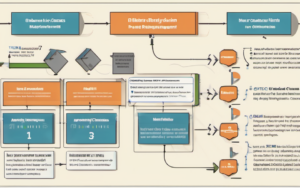The internet, a marvel of modern technology, presents a significant paradox: it connects billions yet leaves many feeling vulnerable. Our digital lives are increasingly intertwined with data collection and surveillance, raising crucial questions about blockchain privacy. While the promise of a more private internet is alluring, exploring whether blockchain technology can truly deliver, and the potential pitfalls it might introduce, is crucial.
1. Introduction
1.1 The Privacy Paradox of the Internet
The internet, a powerful tool for communication and information sharing, has a dark side. Our online activities leave a digital trail, constantly tracked and monitored by various entities. From targeted advertising to potential data breaches, the lack of control over our personal data raises serious privacy concerns. This constant surveillance erodes our autonomy and raises legitimate questions about freedom and security online. This has led many to seek alternative solutions, with blockchain technology emerging as a promising – though not without its challenges – candidate.
1.2 Blockchain Technology: A Brief Overview
At its core, blockchain is a distributed, immutable ledger. Think of it as a shared, constantly updated database replicated across many computers. This decentralization is key to its security and transparency. Transactions are recorded as “blocks” linked together cryptographically, making them virtually tamper-proof. This foundational characteristic has led to its exploration in various fields, from finance to supply chain management, and now, increasingly, to privacy enhancement.
1.3 The Promise of Blockchain for Privacy
Blockchain’s potential to revolutionize internet privacy lies in its ability to shift control of data from centralized entities to individuals. By offering a decentralized and transparent system, it promises to empower users with greater ownership and control over their personal information. This is a stark contrast to the current centralized models where large corporations hold and often exploit user data. The decentralized nature of blockchain inherently mitigates the risk of single points of failure, making it a compelling option for enhancing online privacy.
2. How Blockchain Could Enhance Internet Privacy
2.1 Decentralized Identity Management
2.1.1 Self-Sovereign Identity (SSI)
Blockchain enables the development of self-sovereign identity (SSI) systems, allowing individuals to control their digital identities. Instead of relying on centralized authorities like Facebook or Google, users manage their own data and credentials. This empowers individuals to selectively share information, improving both privacy and security. For example, you could prove your age without revealing your date of birth, greatly enhancing privacy while still meeting verification requirements.
2.1.2 Data Ownership and Control
With SSI, users retain complete control over their data. They decide what information to share and with whom, eliminating the need to trust third-party intermediaries. This significantly reduces the risk of data breaches and misuse. This shift in power dynamics aligns perfectly with the growing global demand for greater digital autonomy and data protection rights. This is a crucial aspect of addressing concerns around blockchain privacy concerns and solutions.
2.2 Secure Data Storage and Sharing
2.2.1 Encryption and Cryptography
Blockchain integrates robust encryption and cryptographic techniques, ensuring data confidentiality and integrity. Data stored on the blockchain is encrypted, making it inaccessible to unauthorized parties. This strengthens the overall security posture of the system, mitigating the risks associated with traditional centralized data storage. The inherent security measures address many of the blockchain technology and internet privacy risks associated with centralized systems.
2.2.2 Immutable Ledger Technology
The immutability of the blockchain is another crucial aspect of its privacy-enhancing capabilities. Once data is recorded on the blockchain, it cannot be altered or deleted, providing a tamper-proof record of transactions and interactions. This transparency and immutability helps build trust and accountability while also protecting against data manipulation and fraud.
2.3 Anonymous Communication Protocols
2.3.1 Mixing Networks and Privacy Coins
Cryptocurrencies like Monero and Zcash leverage blockchain technology and advanced cryptographic techniques to offer enhanced privacy. Mixing networks and privacy coins obfuscate transaction details, making it difficult to track the flow of funds and associate them with specific individuals. This is particularly relevant for individuals concerned about financial surveillance and censorship.
2.3.2 Decentralized Messaging Platforms
Blockchain can underpin decentralized messaging platforms that prioritize user privacy. These platforms can encrypt messages end-to-end, preventing third-party access, and prevent metadata collection. This provides a more secure and private alternative to centralized messaging services that often collect and share user data. These solutions directly address the issue of decentralized internet privacy using blockchain.
3. Potential Challenges and New Privacy Risks
3.1 Scalability and Transaction Costs
Blockchain technology faces scalability challenges. Handling large volumes of transactions can be slow and expensive, limiting its widespread adoption for certain privacy-enhancing applications. This is an ongoing area of research and development, with various solutions emerging to improve the scalability and efficiency of blockchain networks.
3.2 Regulatory Uncertainty and Compliance
The regulatory landscape surrounding blockchain technology is still evolving, creating uncertainty and compliance challenges. Governments worldwide are grappling with how to regulate this emerging technology, which could potentially impact the development and adoption of blockchain-based privacy solutions. This regulatory uncertainty poses a significant hurdle to the widespread adoption of blockchain for privacy enhancement.
3.3 The “Smart Contract” Dilemma
3.3.1 Code Vulnerabilities and Exploits
Smart contracts, self-executing contracts written in code and stored on the blockchain, can be vulnerable to exploits. Bugs in the code can lead to unintended consequences, potentially compromising user data or funds. Rigorous code auditing and security best practices are crucial to mitigate these risks.
3.3.2 Data Transparency and Auditability
While data transparency is often touted as a benefit, it can also pose privacy risks. Depending on the implementation, data stored on a public blockchain may be publicly accessible, potentially exposing sensitive information. Careful consideration of data privacy needs is crucial when designing and implementing blockchain-based systems. This is a key aspect of comparing blockchain and traditional internet privacy models.
3.4 Blockchain’s Carbon Footprint
The energy consumption associated with some blockchain networks, particularly those using proof-of-work consensus mechanisms, has raised environmental concerns. This energy consumption impacts the overall sustainability of the technology and raises questions about its long-term viability as a solution for enhancing internet privacy.
4. The Future of Blockchain and Internet Privacy
4.1 Technological Advancements and Solutions
Ongoing research and development in areas like layer-2 scaling solutions and more energy-efficient consensus mechanisms are addressing some of the limitations of current blockchain technology. These advancements will likely lead to more efficient and scalable blockchain-based privacy solutions.
4.2 The Role of Regulation and Policy
Clear and consistent regulatory frameworks are essential for fostering innovation in the blockchain space while ensuring user privacy and data protection. Collaboration between governments, industry stakeholders, and privacy advocates is crucial to establishing effective regulatory guidelines.
4.3 Balancing Privacy and Security
Striking a balance between privacy and security is paramount. Blockchain-based privacy solutions must be designed to protect user data while also being resistant to attacks and exploits. This requires a holistic approach that considers both technological and regulatory aspects. This discussion is vital when considering blockchain's impact on online data security and privacy.
The potential of blockchain to revolutionize internet privacy is undeniable. However, realizing this potential requires careful consideration of the challenges and risks involved. Responsible innovation, coupled with effective regulation and technological advancements, is crucial to harnessing blockchain’s power for a more private and secure digital future.




